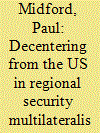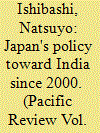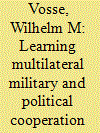|
|
|
Sort Order |
|
|
|
Items / Page
|
|
|
|
|
|
|
| Srl | Item |
| 1 |
ID:
159425


|
|
|
|
|
| Summary/Abstract |
This article argues that the creation of ‘strategic partnerships’ as an alternative form of alignment represents an effort by Tokyo, and other US-allies, to ‘decenter’ their respective security policies from their erstwhile over-dependence on Washington. By examining the nature, purpose, and dynamics of strategic partnerships more closely, and investigating the empirical case of Australia, we can gain a greater appreciation of their significance both to Japan's evolving security policy and the broader role they play in the Asia Pacific security landscape. The article argues that Australia has been the most significant and successful of Japan's new strategic partnerships to date, has therefore come to represent the template for other new alignments, and hence provides a yardstick against which their effectiveness can be measured. It concludes that while the strategic partnership certainly represents a new departure for Japanese security policy – ostensibly independent of the US-alliance – closer inspection reveals how this relationship remains fundamentally bound to the broader American-hub-and-spokes system.
|
|
|
|
|
|
|
|
|
|
|
|
|
|
|
|
| 2 |
ID:
159422


|
|
|
|
|
| Summary/Abstract |
This article poses the question of why, after having consistently pursued an isolationist strategy of avoiding security ties with partners other than the US, and having followed the US in opposing regional security multilateralism, did Japan suddenly reverse course and get out in front of the US with its first post-war regional security initiative. This article addresses this question by tracing the internal debates, policy process and motivations that drove Japan to reverse its position, a process that transformed Japan into the leading champion of regional security multilateralism in East Asia.
|
|
|
|
|
|
|
|
|
|
|
|
|
|
|
|
| 3 |
ID:
159423


|
|
|
|
|
| Summary/Abstract |
Why has Japan attempted to promote Asian security multilateralism for over two decades despite its open acknowledgment of the vital centrality of the US–Japan alliance in its overall foreign and security policy? Why has Japan's pursuit of regional security multilateralism sometimes swayed between an inclusive ‘Asia-Pacific’ (with the US) and an exclusive ‘East Asian’ format (without the US)? This article examines the nature of Japan's approach to Asian security multilateralism through a new analytical model based on the decentering/recentering framework and major theoretical assumptions deriving from neoclassical realism. It unpacks the process by which Japanese policy-makers have come to recognize Asian security multilateralism as a means of advancing perceived political and security interests, arising from international pressures and opportunities. The analysis is divided into three phases; (1) Japan's leading role in the formation of the ASEAN Regional Forum (1991–1994), (2) Japan's initiatives for the establishment of the ASEAN Plus Three and the East Asian Summit (1997–2005), and (3) Japan's renewed focus on the EAS with US membership (2010-onwards). The article reveals the changing dynamics of the ideas and motivations behind Japan's initiatives for Asian security multilateralism.
|
|
|
|
|
|
|
|
|
|
|
|
|
|
|
|
| 4 |
ID:
159421


|
|
|
|
|
| Summary/Abstract |
Japan's lifting of its arms export ban through the Three Principles on the Transfer of Defense Equipment and Technology has opened up new strategic opportunities for its policy-makers to reinforce existing, and build new, security partnerships. Japan still retains the intent to sustain and develop an indigenous defense production base, now through international collaboration rather than mainly autonomous production, and the leverage this may provide to hedge within and outside the US–Japan alliance framework. However, this paper demonstrates that Japan's principal objective through international arms transfers is very much to use this as a mechanism to strengthen Japan's integration of capabilities into the US–Japan alliance and overall US ‘rebalance’ strategy in East Asia. Japan's main moves in developing an arms transfer strategy have either revolved around US–Japan bilateral projects, or cooperation with US allies and partners. Moreover, Japan's continuing deficiencies in military technology and experience of international collaboration on the government and private sector levels means that its arms transfer strategy remains quite limited in ambition and especially implementation.
|
|
|
|
|
|
|
|
|
|
|
|
|
|
|
|
| 5 |
ID:
159426


|
|
|
|
|
| Summary/Abstract |
Japan's policy toward India since 2000 appears to be a sign of new directions in Japan's security policy since its decision to establish a strategic partnership with India is different from the previous policy of exclusive bilateralism centering on the US–Japan alliance. Nonetheless, Japan's recent security partnership with India is part of Japan's long-term effort to support the US-led liberal political and economic order in East Asia. This paper argues that Japan's policy toward India since 2000 has evolved toward becoming fully aligned with US policy toward the Indo-Pacific region. The critical shift in Tokyo's policy toward India came in spring 2005, when Japanese political leaders and policy elites came to recognize India as an important balancer against China as a result of the violent anti-Japanese demonstrations in China. They decided to support including India into the East Asian Summit and incorporated India into their new values diplomacy. This shift in Japan's policy toward India, along with efforts to increase interoperability between Japan's Maritime Self-Defense Forces and Indian Navy, coincides with US strategy to bring India into the US-led coalition to balance against China.
|
|
|
|
|
|
|
|
|
|
|
|
|
|
|
|
| 6 |
ID:
159427


|
|
|
|
|
| Summary/Abstract |
Japan is abandoning its once unidirectional foreign security policy towards the USA, two notable examples of which are its increasingly comprehensive and substantial security relations with the Philippines and Vietnam. Putting these burgeoning Japanese security partnerships front and center, this paper asks the following questions: What are the characteristics of Japan's maturing security partnerships with the Philippines and Vietnam? What factors have driven and enabled their recent emergence? What promotes and constrains their future development? What do these maturing Japanese non-US security partnerships reveal about Japan's direction as a security actor in and beyond East Asia? The paper finds that these two Japanese security bilaterals, which have six basic characteristics in common, are fundamentally driven by the contemporary shift in the balance of power and the strategic challenge that China's emerging maritime power and ambitions present Japan. It moreover argues that the substantiation of these security partnerships have been pursued under American auspices and further invited by Japanese nationalism and security legislative reforms. Notwithstanding these encouraging factors, however, domestic and geo-strategic constraints and counter incentives lead this paper to expect further substantiation, but limited military significance in the future of these security partnerships.
|
|
|
|
|
|
|
|
|
|
|
|
|
|
|
|
| 7 |
ID:
159424


|
|
|
|
|
| Summary/Abstract |
n January 2009, the Japanese government decided to join the multilateral-force counter-piracy operations in the Gulf of Aden and the coast of Somalia and has since then developed into one of the most active and involved forces combatting maritime piracy. This special issue defines de-centering as a ‘process of moving away from a state of centering by building relationships with other partners’ through ‘security and defense consultations and dialogues’. This article argues that this counter-piracy mission involved many if not all of these components and can be seen as an important opportunity for Japan to deepen its understanding of forces and governments of countries and forces other than the United States in various dialogue and coordination forums, joint capacity building, and joint training exercises. While it is not argued that this will in any way weaken US–Japan relations or the role of the United States as Japan's main security guarantor, it demonstrates that Japan and the Self Defense Forces can become a security partner for countries in Europe or NATO. This potentially gives Japan more options whether to support or not support specific foreign policy decisions by the United States, a condition for de-centering.
|
|
|
|
|
|
|
|
|
|
|
|
|
|
|
|
| 8 |
ID:
159420


|
|
|
|
|
| Summary/Abstract |
During the cold war the United States was overwhelmingly central in Japan's security policy. Japan hosted US bases and the Self-Defense Forces held joint exercises with the US military, even while shunning contacts with other militaries. Japan essentially refused even to discuss security with its neighbors. Special exceptions were made for the United States in otherwise sweeping policies, such as the exception for the United States in Tokyo's ban on weapons exports and co-development. Since the end of the cold war, Japan's security policy has undergone a little noticed transformation: it has steadily moved away from being centered on the United States as its sole security partner. Tokyo has initiated bilateral security dialogues with its Asian neighbors and assumed a leadership role in promoting regional multilateral security cooperation as a supplement to the US alliance. Japan has begun building bilateral security partnerships with a range of countries and actors, from Australia and India to the European Union. Paradoxically these changes have occurred even as the US–Japan alliance has strengthened. The articles in this special issue examine these new security ties with states and multilateral organizations, and other changes in policy that have made the United States less ‘special,’ such as by allowing arms exports to other actors.
|
|
|
|
|
|
|
|
|
|
|
|
|
|
|
|
|
|
|
|
|